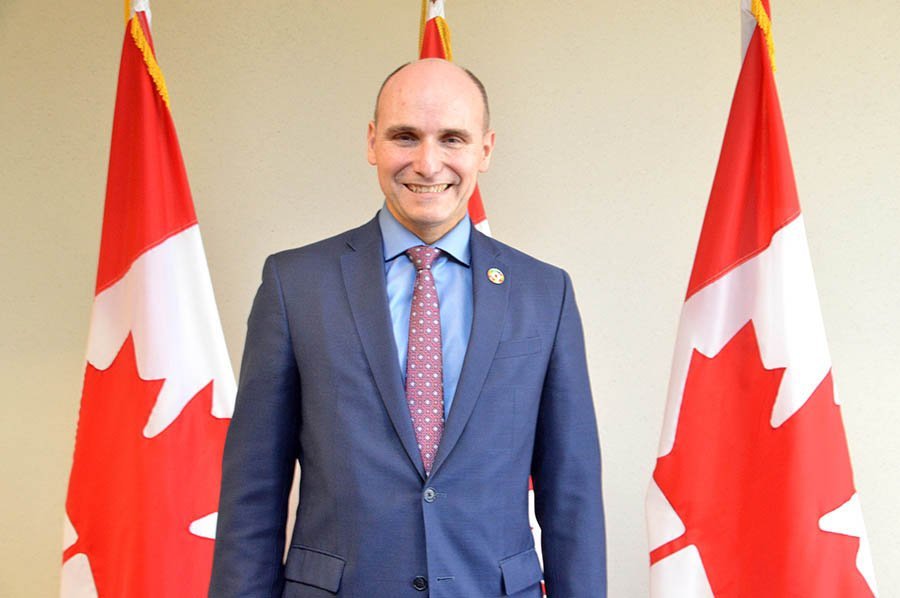
Martin C. Barry
With a federal election due to take place on Oct. 21, the incumbent Liberal government’s Minister for Families, Children and Social Development says he’s concerned that a Conservative government, if elected, would make drastic cuts to a vast array of family-oriented and social welfare programs implemented since 2015 by the Liberals.
Jean-Yves Duclos made the comments during an interview with Newsfirst Multimedia on the same day the conservative provincial government of Ontario led by Premier Doug Ford released its first budget containing widespread austerity measures designed to eliminate the province’s debt by 2024.
Wary of Conservatives
“Conservatives are known for two things,” said Duclos. “First they cut the benefits and services to middle-class Canadians. And second they give tax advantages to the wealthiest Canadians. That’s what they typically do and that’s unfortunately what they will probably also want to do in their election platform.
“We have a very different agenda,” added Duclos. “Our agenda is around supporting middle-class Canadians, and this agenda is working. Because since 2016 we have seen one of the highest growth rates of among the G7 countries.
“Canadians have created 900,000 new jobs. We have the lowest unemployment rate in four decades. We have lifted 825,000 Canadians out of poverty. This is working – strong economic growth – and growth that benefits everyone.
‘A different agenda,’ says Duclos
“The Conservatives have a totally different agenda,” said Duclos, a professional economist. “They are in 19th century economics where they believe that the only way to grow the economy is to help the wealthiest Canadians. But that’s not how it works in the 21st century.”
Duclos is a member of Prime Minister Justin Trudeau’s original cabinet which was sworn in on Nov. 4, 2015 following the Oct. 19 general election. Despite a number of cabinet shuffles that have moved some cabinet members to new portfolios while sidelining others, Duclos has consistently retained his responsibilities for a ministry with a fair amount of oversight, despite its sometimes low profile.
A Quebec City native
Duclos hails from the Quebec City area, where he was one of only two Liberals to win seats in the 2015 general election. In that election, Duclos found himself in a tight race against second-place incumbent Annick Papillon of the NDP who’d been elected four years before in the NDP ‘Orange Crush’. She finished exactly 1,000 votes behind him.
The 53-year-old Duclos is a highly-respected academic. He was Director of the Department of Economics and a tenured professor at Université Laval. He earned a Bachelor of Arts in Economics (First-Class Honours) from the University of Alberta, and his master’s and doctoral degrees in Economics from the London School of Economics and Political Science. In 2014, he was elected a Fellow of the Royal Society of Canada, the highest accolade bestowed on Canadian researchers.

Federal homelessness program
Among the major programs Duclos’ ministry is currently promoting is Reaching Home: Canada’s Homelessness Strategy, which was officially launched this past April 1. First announced in June last year, Reaching Home replaces the existing Homelessness Partnering Strategy, with a goal of reducing chronic homelessness by 50 per cent nationally by 2027-28.
“The most important thing is to recognize that to be homeless in 2019 is unacceptable,” Duclos told Newsfirst Multimedia. “We have a developed country, yet we have not the ability to look after each other. What should be is that no one should be left alone on the streets.
“But the second thing is that homelessness comes both from lack of affordable housing – and we know that housing is not affordable for many people – but also sometimes because of challenges: it could be health challenges, mental health, addictions.
The roots of homelessness
“It could be because of handicaps, youths coming out of institutions or people with disabilities who find it difficult to access proper housing. So homelessness doesn’t appear out of nowhere. It appears because there are unfortunately barriers for people to have an affordable and safe place to live.”
Ottawa has committed a total of $2.2 billion over 10 years to the Reaching Home program. By 2021–22, the amount allotted in 2015–16 would double, depending on who is in power in Ottawa by then.
Duclos acknowledges that homelessness has been on the increase everywhere in Canada for the past 20 years. While saying that funding from Ottawa to deal with the problem was consistent from 1998 to 2015, he suggested it could perhaps be used in a more targeted fashion. “It’s an issue of reducing homelessness, but also preventing it,” said Duclos.
How to fight homelessness
“That involves looking at the different challenges: women in domestic violence, younger Canadians coming out of institutional care, veterans, people with handicaps, with mental health issues. So having housing, but also services, to protect these people and prevent them from being homeless again.”
Asked whether he ever understood why the problem continues growing, Duclos responded, “Because of economic and social changes. Economic changes because work is more precarious and people lose their jobs more easily now. Also because of family separation which is more prevalent. And also an increase in mental health issues and addictions across the country. And again because of the lack of housing affordability.”



